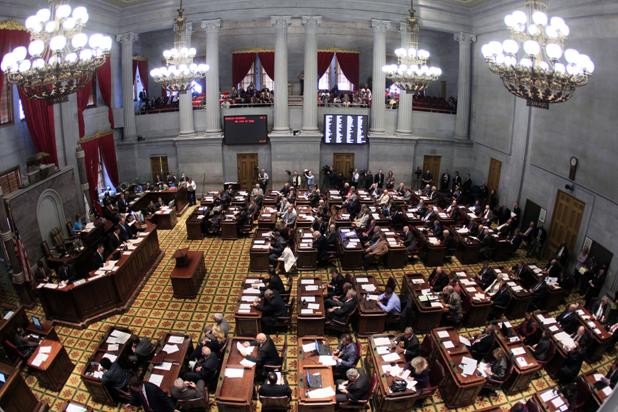
Over the course of time — and quite a lot recently — we have had much to say about the Tennessee General Assembly’s annual legislative value judgments (if that’s not too oxymoronic a term). More than once, we have
characterized them in cartoons as hillbillies (and that was if we were feeling kindly.)
That kind of rude jesting on our part had actually begun well before the state’s voting population began its pell-mell rush to the flag of Tea Party Republicanism. Since that happened, beginning with the election of 2008, more or less, and proceeding geometrically in that direction ever since, we have often been stupefied — uncertain as to how much further we could go with such ad hominem characterizations without being considered either too rabid or, worse, guilty of gross understatement.
We’re still a little buffaloed, frankly, as to how and why the Tennessee GOP was able to expand so far beyond its East Tennessee hinterland, where a relatively genteel and moderate version of Republicanism had flourished since the Civil War, as a result of the region’s hill-country pro-Unionism, and how and why the party’s philosophy had shifted so far rightward.
Our puzzlement was amplified by the fact that those original advances into Middle and West Tennessee (in the direction of what was then called a “two-party system”) were facilitated by Memphis’ own Lewis Donelson, a genteel presence whose protégés — office-holders like Howard Baker and Winfield Dunn and the early version of Lamar Alexander — were thoughtful additions to a thriving political debate that for some gave Tennessee the reputation of a bellwether state, one that could go back and forth between the two major parties in tune with shifts in the regional and national mood.
All that began careening to an end in 2008, more or less simultaneously with the election and then the administration of an African-American president. Or maybe that was just a coincidence. In any case, Tennessee is now, like the rest of the South, and in some ways more so, resolutely red, with only trace amounts of Democrats, mainly in Nashville and Memphis.
But we have come to praise the General Assembly, not to bury it. Granted, in the last session, there was yet another gratuitous firearms bill, which our well-intentioned but, er, gun-shy governor signed into law after pointing out concisely its more dangerous attributes. And there was the expected bill adding new anti-abortion restrictions to state law. Worst of all, there was the refusal to accept a badly needed Medicaid-expansion bill, largely because the word “Obamacare” was attached to it by opponents.
On the plus side, this Republican super-majority legislature refused for the third year in a row to devalue public education with a school-voucher bill, approved a halfway decent educational-standards measure, rejected a Bible-as-state-book bill that would have trashed the barrier between church and state, gave the concept of medical marijuana a fair hearing, and, arguably best of all, came within a single vote — that of an absent Democrat — of approving in-state tuition allowances for children of undocumented aliens, with a bill that is said to be sure of passage next year (see Viewpoint).
All things considered, this is progress. Maybe something like a normal political spectrum has reasserted itself within the confines of our one-party state. We are entitled to hope.